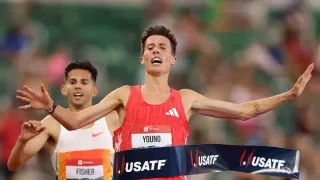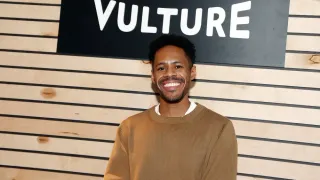
Sep 24
Mitch Brown’s Powerful Podcast Appearance Shines Light on Bi Visibility
READ TIME: 7 MIN.
Australian rules football saw a landmark moment this week as Mitch Brown, former West Coast Eagles player, sat down with the hosts of The Imperfects podcast to share his experience as the first openly bisexual male player in the sport’s 129-year history . Brown’s appearance coincided with Bi Visibility Day, amplifying his message about the importance of representation, safe spaces, and authentic self-expression for bisexual individuals and the broader LGBTQ+ community.
@inheritedthepod #football #afl #queer #lgbtq #mitchbrown ♬ original sound - Inherited Podcast
Brown’s journey has been shaped by the hyper-masculine culture of Australian football—a world where rigid expectations often suppress difference. “The environments I grew up in formed me and suppressed my identity from a young age,” Brown explained, recounting the years he spent navigating imposter syndrome, grappling with past mistakes, and searching for acceptance both within himself and from others .
Brown’s coming out represents a seismic shift for the AFL, a league long criticized for its lack of openly LGBTQ+ players. On the podcast, he emphasized the critical importance of role models and visibility, especially for young bisexual men who rarely see themselves reflected in sporting heroes. “Being visible matters,” Brown said, “not just for me, but for every kid out there wondering if there’s a place for them in sport” .
@theimperfectspodcast Mitch Brown made history by becoming the first man in 129 years of AFL to come out as bisexual. The public’s reaction and the messages he’s received in the last few weeks show just how important visibility is. In this episode, Mitch speaks about what it was like growing up in a hyper-masculine environment playing footy with his brothers. He talks about feeling like ‘the spare’ to his twin brother Nathan and struggling to find his own identity, and why it was important to have empathy for Izak Rankine after he was banned for using a homophobic slur. Today, Mitch is living as his authentic self, co-parenting and being a loving partner and friend. In his words, “families look different and that’s beautiful.” Listen now wherever you get your podcasts or watch the full episode on YouTube.
♬ original sound - The Imperfects
His reflections were particularly timely as Bi Visibility Day (September 23) approached—a day designed to celebrate the contributions, struggles, and uniqueness of bisexual people worldwide. For Brown, the day is both deeply personal and politically significant. “Bi guys like me should try ‘jumping out of the plane,’” he said, referencing the courage required to come out in environments where bisexuality is often misunderstood or marginalized .
Brown’s appearance on The Imperfects was not only about celebration, but also about accountability and empathy. In recent weeks, the AFL has been rocked by a homophobic slur scandal involving Adelaide Crows forward Izak Rankine, who received a four-game suspension after using a slur during a match with Collingwood . Brown reached out to Rankine in the wake of the incident, expressing compassion rather than condemnation. “I don’t blame Izak Rankine. I would never point out an individual, it’s more than that,” Brown stated. “He’s not a bad person. I watched him on screen apologising, and I could feel the hurt and heaviness on him” .
@lmk283mjb Happy Bisexual Awareness week 💖💜💙
♬ original sound - Lou + Mitch
Brown’s message was clear: systemic homophobia in sport cannot be reduced to the actions of one individual. Instead, he urged the public and the AFL community to address the culture that enables discrimination, while also supporting those who make mistakes and seek to learn. He encouraged Rankine to remember that he remains “an amazing role model,” and not to let one incident define his life or career .
The weeks following Brown’s public coming out have been “monumental, overwhelming, and joyful,” but not without deep grief. On the podcast, Brown acknowledged the pain of those in his life who felt they had let him down or failed to create a safe space for his identity . “There’s a lot of healing to do—not just for me, but for people around me who are now realizing how their actions impacted my journey,” he said.
The response from fans, teammates, and the wider public has been largely supportive, with many expressing gratitude for Brown’s courage and vulnerability. The Imperfects hosts echoed this sentiment, telling Brown, “You are making the world a better place. We love you (so much)” .
The Imperfects podcast has become a vital space for stories that challenge norms and inspire change. Brown’s episode, titled “We Waited 129 Years For This,” delves into the intersections of sport, masculinity, and sexuality, offering listeners a rare glimpse into the complexities faced by LGBTQ+ athletes in professional environments .
The episode also touches on sensitive topics, including sexual assault. The podcast’s hosts advise listeners who may be affected to proceed with care, emphasizing their commitment to creating a safe and inclusive space for all .
Brown’s visibility and advocacy mark a turning point for AFL and Australian sport at large. His journey is a testament to the importance of creating inclusive spaces where LGBTQ+ athletes can thrive without fear. As more sporting organizations reckon with their histories and strive for greater equity, stories like Brown’s set a powerful precedent.
For the bisexual community in particular, Brown’s message resonates: authentic self-expression is possible, and courage can inspire systemic change. As Bi Visibility Day continues to grow in prominence, Brown’s story reminds us that every leap—whether out of the metaphorical plane or onto the field—matters .
Brown’s reflections highlight ongoing challenges for bisexual individuals, including erasure, biphobia, and the pressure to conform to binary identities. His advocacy calls for empathy, healing, and education across all levels of sport and society. By sharing his vulnerabilities and triumphs, Brown offers hope for those still navigating their own journeys, and sets the stage for a more welcoming future in Australian football and beyond .
As Brown’s story continues to unfold, the impact of his visibility will be felt not only in locker rooms and stadiums, but in every space where LGBTQ+ individuals strive to belong.






